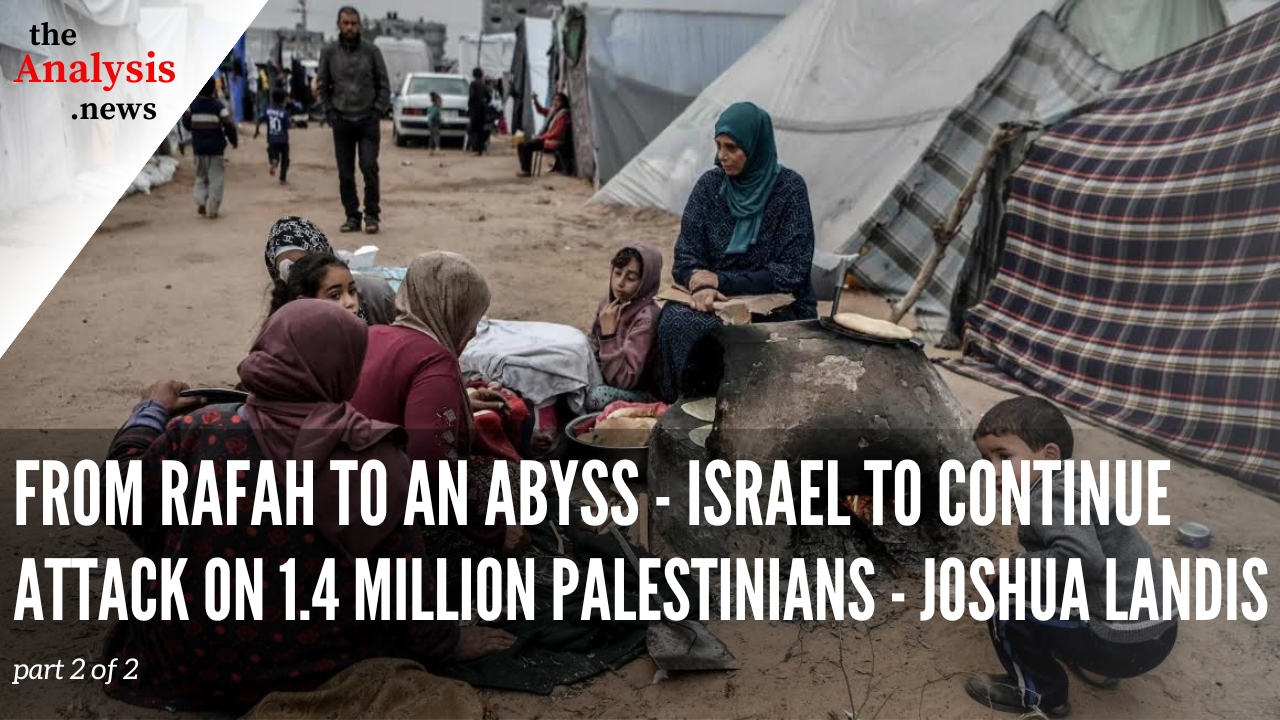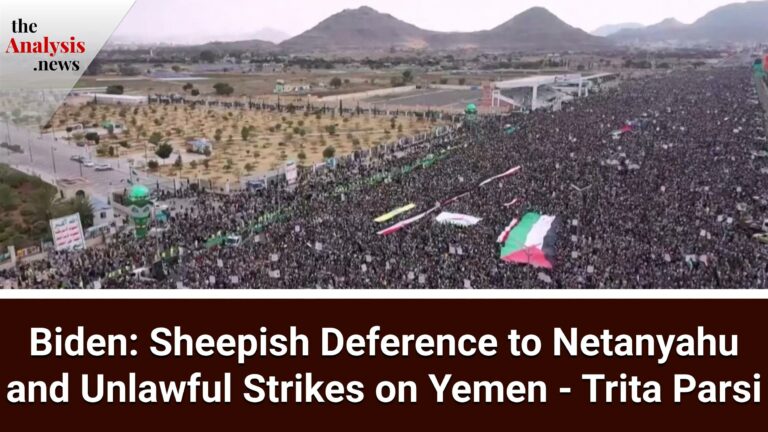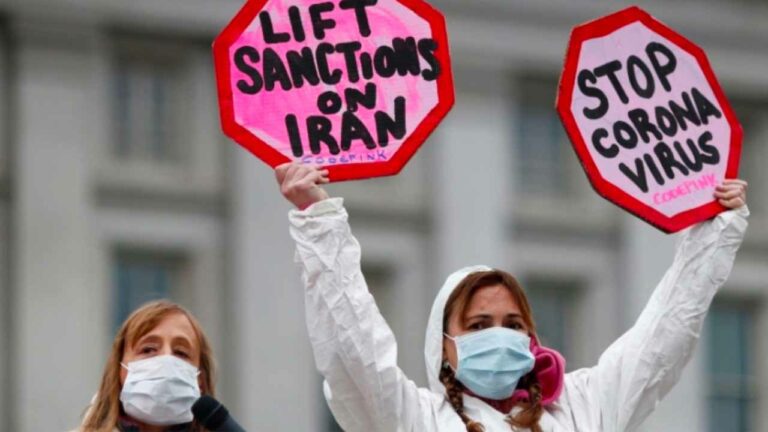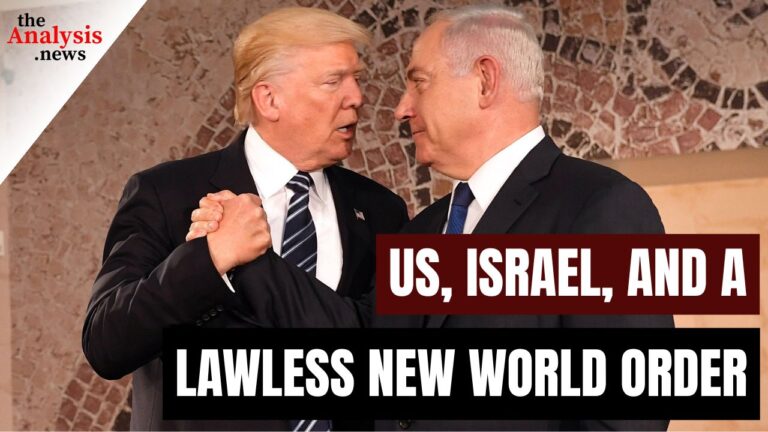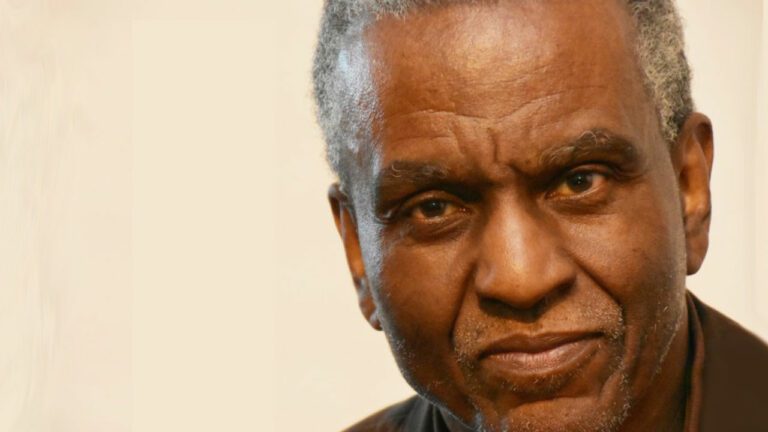In part 2, Joshua Landis discusses Hamas’ recent ceasefire proposal and Israeli Prime Minister Netanyahu’s planned ground incursion into Rafah. Netanyahu has rejected international calls to abandon a military onslaught on the densely populated area around the Rafah Crossing, where 1.4 million Palestinians from all over the Gaza Strip are seeking shelter in a 64-square-kilometer area. Landis contends that Bibi’s explicit repudiation of a two-state solution, as well as lack of plans to guarantee the safety of civilians before launching an invasion of Rafah, does little to assuage concerns about the continued ethnic cleansing of Palestinians from the Gaza Strip.
Should the U.S. Withdraw Its Troops from Iraq and Syria? – Joshua Landis (part 1/2)
Talia Baroncelli
Hi, I’m Talia Baroncelli, and you’re watching theAnalysis.news. You’re currently watching part 2 of my discussion with Professor Joshua Landis. Part 2 goes into the proposed ceasefire deal, while in part 1, we already covered the unlawful strikes in the Middle East carried out by the U.S. and the U.K.
If you’d like to give us a boost and support us, you can do so by going to our website, theAnalysis.news, and hitting the donate button at the top right corner of the screen. Make sure you get onto our mailing list and like and subscribe to the show wherever you watch it. See you in a bit with Joshua for part two.
I’m very excited to have Joshua Landis here with me today. He is the Director of the Center for Middle East Studies and Sandra Makey Professor at the University of Oklahoma. He’s also a non-resident Fellow at the Quincy Institute for Responsible Statecraft. Thanks so much for joining me today, Joshua.
Joshua Landis
Talia, It’s a pleasure.
Talia Baroncelli
We’ve seen numerous strikes throughout the Middle East now conducted by the U.S. In response to the Houthis attacking commercial vessels in the Red Sea, the U.S. and the U.K. have launched unlawful strikes. You hear all sorts of U.S. officials saying that those two things are not related, that the strikes launched by the Houthis on ships in the Red Sea are not related to Gaza at all, and that they’re just trying to take advantage of the situation. The Houthis themselves have said that they would stop these strikes if there were to be a ceasefire.
I think it was last week that four U.S. senators, Tim Kaine, Mike Lee, Chris Murphy, and Todd Young, two Republicans and two Democrats, sent a letter to Biden deploring his strategy so far, his executive strategy of launching offensive strikes and saying that they’re defensive, that they’re trying to send off an imminent threat on U.S. security in the form of, I guess, vessels going through the Red Sea, but then strikes throughout Iraq and Syria.
I wonder, do you see Biden going to Congress at all? Part of the outrage here from Mike Lee is that these strikes are in contravention of Article I of the Constitution, of the War Powers Act. They don’t go to Congress for any authorizations. Do you see Biden at some point going to Congress with this to try to get some legitimacy for these strikes?
Joshua Landis
I don’t. I think that Biden will just use his presidential powers. Ultimately, his opponent, Donald Trump, is going to do the same thing. Trump’s not going to criticize him on this and say, “You’ve got to go by the Constitution and go to Congress.” I think he gets a pass there. Congress is overwhelmingly pro-Israel. They’re supporting his stand on Israel, and they’re actually criticizing him for not bombing Iran directly.
It’s only the left and the Democratic Party, which is fairly isolated today, that has this traction, is calling for these things. It’s a small number.
Largely, Biden’s policy is very popular in Congress. They want him to stand even further up for Israel and to help Israel kill more Palestinians and hurt Iran more. That’s the reality of American politics today. This rear guard action on the part of Democrats, Arab Americans, and young people to try to balance this policy, which has become very one-sided and is really damaging America, damaging it in the Middle East, but damaging it, I think, in the international community much larger because we’re alienating our European allies, but we’re alienating the Brazilians, and South Africa. The Global South is a mixture of horrified and also chuckling because they’re mocking America at every turn for being a hypocrite, for talking about a rules-based order and then going off and supporting the slaughter of Palestinians, where hospitals and universities are being routinely blown up, and all the historical sites. It’s a massacre, and you can’t conceal that, despite all of our spokespeople who say, “No, this is war, and we’re trying to stop this.” It’s a joke. The world sees it as a joke, and it’s diminishing America’s prestige, and whatever inherited legitimacy it has on the international stage. It’s helping China, it’s helping Iran tremendously, and Russia.
Talia Baroncelli
You can’t hide the double standard there, especially when you see people like the National Security Council spokesperson, Admiral John Kirby. If you look at what he was saying in response to Russia and Ukraine, saying that attacks on hospitals are clearly war crimes. But then, if you ask him whether Israeli attacks or IDF attacks on hospitals or other areas of civilian infrastructure constitute war crimes, he’ll say things like, “Oh, well, I’m not a lawyer to make that case,” or he’ll defend those.
Joshua Landis
Biden’s most recent statement about Hamas’s negotiated stance in saying that they want a complete ceasefire, and he calls this over the top, that it’s too much. They shouldn’t be asking for a stop to this pummelling. What more can you say?
Talia Baroncelli
Let’s actually talk about that ceasefire. Hamas proposed a ceasefire, which would essentially entail three different stages. There would be three stages, each constituting 45 days. I think the main goal would obviously be to get more humanitarian aid into the Gaza Strip and to release the hostages in return for more of a permanent ceasefire. I think that’s why [Antony] Blinken said that there are non-starters in this proposal but that there’s some space for a potential agreement.
Unfortunately, Israeli Prime Minister Bibi Netanyahu has said that the proposal is delusional. It’s a bit hard to tell what is actually going on when you hear someone like Secretary of State Blinken saying that there might be some wiggle room or some room for an agreement, and then Netanyahu completely [turning it down].
Joshua Landis
Well, Blinken has to say that. Blinken has to say that there’s hope. The basic problem is that Hamas wants a total ceasefire and is not going to stop. It’s not going to give itself up to be killed. Netanyahu wants to kill the people he’s negotiating with and has said he will not stop until he does that.
When Hamas says, “No, you need a total ceasefire and to stop killing us,” there’s a breakdown because Hamas doesn’t want to be killed and isn’t going to, obviously, agree to an agreement that will legitimize that. Netanyahu has promised Israelis that he won’t stop until he’s killed [Yahya] Sinwar and all the people he’s negotiating with.
Yes, there are little things they’re talking about: hostage releases and so forth, but the ultimate breakdown is over whether Hamas is a legitimate interlocutor and represents Palestinians or whether it does not and should be killed. It’s a terrorist organization and should be killed. Of course, America and Israel’s point of view is that they are terrorists and they should be killed. I think the majority of Palestinians, and probably many people across the Middle East, believe that Hamas cannot be killed, that it represents a legitimate Palestinian desire for self-determination, and that it stood up for Palestinians who were getting steamrolled in the Abraham Accords, and that ultimately, they need to be part of any negotiated solution, that you can’t just ignore them because the negotiations won’t be successful.
If you do ignore them, it would be like, if you make a comparison with Israel, I mean, [Menachem] Begin and [Yitzhak] Shamir, two of the important Israeli prime ministers in the last 50 years, were both members of terrorist groups that blew up British soldiers and officers, and other civilians, in an effort to liberate their territory, and to get the British out, and to take it away from the Palestinians. They were very successful, and they’re lauded, and they’re lionized by Israelis today and became prime ministers, even though they were labeled as terrorists. They became part of the negotiations and a part of Israeli politics, in the same way that one could say that Hamas represents a current [opinion] in Palestinian society that can’t be ignored. As long as it is ignored, there’s going to be violence.
Talia Baroncelli
You have to change the underlying conditions that are contributing to the violence in the first place, and that is the occupation. Unfortunately, if you look at the IDF operation right now, it seems like what they’re doing is to push Palestinians from Gaza City to Khan Yunis and then to the Rafah Crossing. It seems like people have nowhere to go. There is something like over a million Palestinians gathered around the Rafah Crossing, and that’s where the IDF wants to intensify its military operation.
Maybe this sounds a bit cliché, but it does seem like the worst is actually yet to come if they carry out this operation in an extremely densely populated area where there’s a humanitarian crisis of gigantic proportions.
There was a recent poll, and this poll has been discussed over the past few days, a poll conducted by the Israeli Democracy Institute in Israel. I think there were something like over 700 adults surveyed in this poll, and 51% of them, or around 50% of them, said that they would be opposed to the creation of a Palestinian state if that’s what a ceasefire would actually demand. If there was an end to hostilities and a ceasefire, the consequence or outcome of that would be the creation of a Palestinian state, then they would be opposed to that.
At the same time, the polls show that a lot of people are in favor of earlier elections. It seems like they’re not really supportive of what Netanyahu is doing, but at the same time, they can’t envision the creation of a Palestinian state. Maybe they’re still suffering trauma from October 7, and through the fog of war, they can’t see the suffering of the Palestinians. That’s a big generalization, but what do you make of the Israeli mindset that particular poll is capturing right now?
Joshua Landis
Well, I think it probably reflects a reality, which is that Israelis don’t want to see an independent Palestinian state. It seems fairly clear from the policies of the last 50 years that have seen the failure of all these negotiations and attempts by the United States and others to push for some two-state solution, which has failed.
Today, we have 700,000 settlers in the occupied territories that have moved there under policies that have been stated, like [inaudible 00:12:52] and others, that let us defeat the Camp David Accords and any attempt to create an independent Palestinian state. If you look at the graph of settler movement on the West Bank, it’s a straight line. That’s important because whether Labor or Likud, whether the left or the right, whether it’s during times of Camp David negotiations or times of Intifada when things have broken down, the settler movement is not being slowed by governments, one side or the other. This is a project that’s been ongoing in Israel that no government can stop. Today, it’s gained momentum in numbers, where I think most smart observers are saying there can’t really be a two-state solution. It’s been foreclosed. I think a lot of Israelis understand that. The only alternative is to smash the Palestinians.
Now, of course, the further, farther right in Israel would like to ethnically cleanse the Palestinians, and they see that the answer to Gaza is to push them out. There have been proposals to build an island offshore to get them to Egypt. Netanyahu went around to the various Arab presidents and Western presidents and tried to get them to accept this notion of a transfer of the Palestinians of the Gaza population. I think many Israelis see that as the best solution for them.
Obviously, the international community is trying to keep its foot in the door. Certainly, [Abdel Fattah El-]Sisi of Egypt has his foot firmly on that door. But as these Palestinians gather along that wall in Rafah, one could imagine where the errant Israeli bombs would destroy the wall, and there would be an outpouring. People would flee to Egypt. For many Israelis, that would be a good outcome because then they would never go back, and that would reduce the problem for Israel.
Today in Israel, there are seven million Palestinians and Arabs living in historic Israel-Palestine, and there are seven million Jews. That creates a very difficult problem on how to solve that issue without a two-state solution. Were there to be a one-state solution, it would be hard to maintain a Jewish state that’s democratic.
The problem is a difficult one. Nobody believes that the United States really means to support a two-state solution today. When President Biden says, “We can’t go back to the status quo, and we need to support a two-state solution,” I don’t think any Palestinians believe that he means that. He means them to shut up, stop fighting, give up Hamas to be killed, and then it’ll be Trump or somebody else will be the next president, and it’ll be all gone, and they’ll never see the light of day because he’s very committed to Israel. He’s not going to pressure Israel to give up land.
I think there’s total distrust on the part of most Arab governments and Palestinians to what America says it can and will do in pressuring Israel. I don’t think they believe in a two-state solution. The alternative to that is supporting Hamas, who are fighting.
There’s despair, and most Palestinians don’t like what Hamas stands for. They don’t like the Islamist government, but they don’t know what else to do today. There is despair. There’s confusion. You don’t see a really effective alternative Palestinian leadership that can support a liberal answer because liberalism has led the Palestinians nowhere. That’s the problem, is that the international community has not stood behind the liberal Palestinians enough to get them an independent state. And so Hamas has stepped into their shoes and has become the only force that seems to be able to stand up for Palestinians today, which is a sad situation. It’s bad for the West. It’s bad for Israel. I think it is certainly bad for the Palestinians.
Talia Baroncelli
There’s evidence that Benjamin Netanyahu has actively supported Hamas by funneling money to them through the Qataris in order to have an enemy union.
Joshua Landis
Yes. Netanyahu has done everything he can to defeat the Palestinians, and dividing and conquering them has been his central strategy to keep Hamas alive in Gaza because he knows that as a terrorist organization, the West can’t speak to it, that it underlines how divided and ineffective the Palestinian leadership is. He can continually say to the world, “Who are we supposed to negotiate with? We don’t have any. We’re going to kill them.”
Of course, the Palestinians are to blame for part of this, for not having… I don’t know. It’s hard today to blame Palestinians when they’re getting so trounced.
Talia Baroncelli
Yes.
Joshua Landis
What you’re saying, which is that the Israeli government has done everything it can to undermine the Palestinians so that there will not be a Palestinian independent state, is true. That comes back to your original question, which is that I think most Israelis have come to believe that they don’t have to make difficult concessions to the Palestinians, that they can destroy them and keep them subservient, which they probably will be able to do for another 20 years. So long as the United States is willing to help them and cover them in the United Nations by vetoing any anti-Israeli or any effort by the international community to uphold international law, they can do it, and they are doing it. That’s very sad.
Talia Baroncelli
Yeah, they’re not applying their leverage to prevent it.
Joshua Landis
Right. We look at what’s happened in Gaza over the last four months, and everything is being blown up in that entire place. There’s no history being left there. All the mosques, churches, universities, and anything that stands for cultural hope and the future of building an independent people with a past and a future are being destroyed.
Talia Baroncelli
Yeah, it’s not just destruction, and this will be my last comment on this. It’s not just the destruction or killing of people, an ethnic cleansing of people, but also the destruction of everything that symbolizes their integrity and their sources of knowledge. Destroying all the universities, for example, and destroying all the civilian infrastructure that is necessary and represents these places where people could come together and discuss things and write and learn because they can’t really go anywhere else. Those are the only places that they can go to. In a way, there’s this symbolic element of it of just destroying everything that represents the Palestinians in that area to crush them morally, in a way.
Joshua Landis
Yes. And physically, yes. In every way. It’s going to lead to a very bad outcome with people who are seeking revenge, furious, and completely distrustful of any international law. That’s going to lead to more terrorism and more violence. It’s not a good outcome.
The United States makes these promises of a two-state solution, as do Europeans and the international community. So long as they don’t follow through and pressure Israel to withdraw from the West Bank and allow the Palestinians some modicum of justice and self-determination, it’s going to destabilize the region. It will certainly undermine America’s legitimacy, effectiveness, and ability to operate in the region without getting attacked constantly as it is today. That’s what we’re seeing, this constant tit-for-tat because people don’t like Americans. They don’t want them in the region. They’re hurting lots of Middle Eastern people. Our crushing sanctions on Iran, increasingly on Yemen, on Syria, are hurting millions and millions of people. It’s natural for them to strike back, to try and drive America out.
Talia Baroncelli
Well, Josh Landis, it was really great to get your very candid and insightful perspectives on what’s going on right now. Hopefully, next time, we can speak a bit more about Syria as well and hope for some more positive developments.
Joshua Landis
Well, Talia, thank you very much for this wonderful interview. It was a pleasure talking with you.
Talia Baroncelli
It’s been great. Thank you for watching theAnalysis.news. If you’d like to support us, you can go to our website, theAnalysis.news, get onto our mailing list and hit the donate button at the top right corner of the screen. Thanks for tuning in.
Podcast: Play in new window | Download | Embed
Subscribe Apple Podcasts | Spotify | Android | iHeartRadio | Blubrry | TuneIn | Deezer | RSS
Never miss another story
Subscribe to theAnalysis.news – Newsletter
Joshua M. Landis is an American academic who specializes in the Middle East and is an expert on Syria. He is the head of the Center for Middle East Studies at the University of Oklahoma, and since 2004, he has published the blog Syria Comment.
